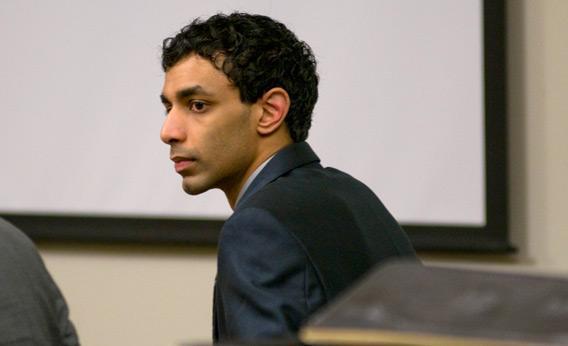Dharun Ravi is a strange case. It’s hard not to conclude, as did Emily in a New York Times op-ed, that, while he behaved cruelly toward Tyler Clementi, he appears likely to receive too heavy a penalty in the wake of Clementi’s death from suicide. Having been convicted last week of fifteen counts, including bias intimidation, for spying on his gay roommate’s romance by webcam and tweeting about it, Ravi faces as much as ten years in prison and may wind up deported to India, where he was born. As Ian Parker has written about this case in the New Yorker:
If prosecutors had been able to charge Ravi with shiftiness and bad faith—if the criminal law exactly reflected common moral judgments about kindness and reliability—then to convict him would be easy. The long indictment against Ravi can be seen as a kind of regretful commentary about the absence of such statutes.
But it’s also easy to see where Ravi could have helped himself many times along the way after Clementi’s death–first, if he hadn’t altered tweets he’d sent out about Clementi once he learned police were investigating the case, and then if he’d only accepted a plea deal that would have given him no jail time, and last, as Emily has argued, if he’d agreed to take the stand in his own defense. As Emily put it, “He didn’t give the jury enough reason to spare him.” It’s hard to conjure sympathy for someone who seems so unwilling to explain himself. Add in the fact that, again and again in the New Yorker article, Ravi, 20, shows himself to be arrogant, insecure, self-serving and dishonest–a volatile mix that afflicts certain young men and that, time and other factors allowing, he might one day grow out of. (This is a guy whose computer password was “DHARUNISAWESOME.”)
And now Ravi compounds the error in a public relations campaign that is probably calculated to milk the sympathy that has built around his situation, but instead showcases his questionable judgment. Ravi has just given interviews to ABC’s 20/20 and Newark’s Star-Ledger that make him sound unrepentant and self-righteous. He says he feels “energized” to keep fighting after the verdict. He says he has concluded of Clementi that “I wasn’t the one who caused him to jump off the bridge.” He apologizes and says he’s sorry for being insensitive and “self-absorbed,” but then he spends a good deal of time in self-absorbed justifications for his behavior. “I wasn’t biased,” he tells the Star-Ledger. “I didn’t act out of hate.” And on 20/20: “So much worse happens. … Kids actually get bullied and actually go through stuff much worse than this.”
He mourns the fact that Clementi’s death means he’ll never know if his roommate actually read his apology messages, which he finds “frustrating.”
Ravi’s enthusiasm for defending himself suggests he thinks this is all about him. It never was. He fails to grasp that it’s not his place to read Clementi’s mind, to imagine that he could have done worse to his roommate, or to interpret his roommate’s death as a roadblock on his journey to find closure. A simple apology would have been more than enough. If, in the end, Ravi receives a sentencing disproportionate to his actions, he may safely assume that he did nothing to help himself.
